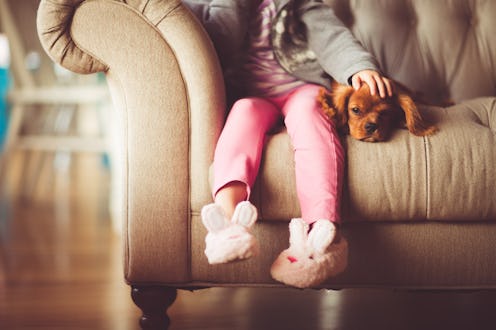Life
Children May Like Their Pets More Than Siblings
In news that will surprise no one who grew up with a brother or sister, psychology researchers from the University of Cambridge have found that children are more attached to pets than to siblings. As someone who grew up with two sisters and multiple dogs, this makes perfect sense to me. I adore my wonderful sisters, but when you’re a kid, it’s not surprising that you might prefer a playmate who doesn’t tease you, compete with you for your parents’ affection, or try to steal your American Girl doll. (Well, except maybe to chew on her a little bit.) And if that playmate is sweet and furry, well, all the better.
Published in the March/April edition of the Journal of Applied Developmental Psychology, this study was conducted by Cambridge researchers in partnership with the WALTHAM Centre for Pet Nutrition, part of Mars Petcare and the Economic and Social Research Council. To investigate the relationship between children and their pets, the researchers surveyed a group of 12-year-olds. Hailing from 77 families, all of the children surveyed had at least one sibling and one pet at home.
“Anyone who has loved a childhood pet knows that we turn to them for companionship and disclosure, just like relationships between people,” lead author Matt Cassells explained in a press release. “We wanted to know how strong these relationships are with pets relative to other close family ties.” The study found that children had strong relationships with their pets, even when compared to their relationships with their brothers and sisters. The kids surveyed had especially close relationships with the dogs in their households, reporting less conflict and more satisfaction with dogs than with cats and other animals.
According to the study, kids bond with pets as much, if not more, than they do with their human family members. “Even though pets may not fully understand or respond verbally, the level of disclosure to pets was no less than to siblings,” Cassells remarked. “The fact that pets cannot understand or talk back may even be a benefit as it means they are completely non-judgmental.”
One fascinating aspect of this study is that it showed that girls and boys relate to their pets differently. Cassells explained, “While boys and girls were equally satisfied with their pets, girls reported more disclosure, companionship, and conflict with their pet than did boys, perhaps indicating that girls may interact with their pets in more nuanced ways.”
Children are deeply affected by the relationships in their lives, and this study goes to show that those relationships don’t always have to be with humans. Obviously, sibling relationships are important in their own way, and irreplaceable. (I mean, I love my dog, but she’s never helped me pick out jeans.) But we shouldn’t discount the impact that a pet has on a child’s social and emotional development. And on a completely superficial level, is there anything cuter than a child with a beloved pet?
There is not.
